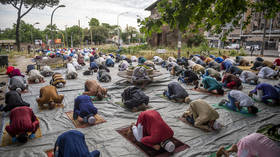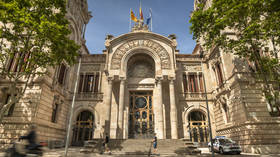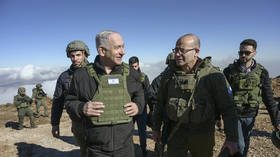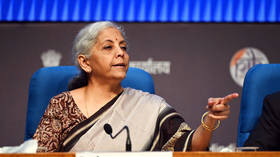EU member worried about ‘underground’ mosques – media

Italian security services are monitoring 53 “unofficial” Muslim prayer sites in Rome, concerned about radicalization and terrorism, according to a news report.
Improvised prayer spaces have proliferated as the number of Muslim immigrants in the Italian capital grew, opening up in warehouses, garages, apartments, and basements. The authorities tolerate them, even though some are technically illegal.
“These hidden places of worship are where radicalization lurks and where, camouflaged among the faithful, those lone wolves who have too often become martyrs of the holy war hide,” the newspaper ll Tempo said on Friday.
The number of underground mosques under surveillance has nearly doubled from 30 a decade ago, the newspaper noted, citing a report by the Italian Interior Ministry.
The total number of unregistered places of worship may be over 100, according to the outlet, which described Rome as “increasingly the capital of Islam.”
The situation does not appear to be limited to Rome. Undercover journalists from the news program Fuori dal Coro recently visited some of the underground mosques in Milan, during the Muslim holy month of Ramadan, producing a documentary titled “Immigrants and Violence, The Muslims Who Hate Italy.”
One of the men, described as a “radical Islamist,” said it is written in the Quran that the Muslims will “kick out the Jews.” He also believes that Muslims will soon conquer the West, starting with Italy because it “has a good heart” and is “very close to Islam.”
“Just look at the churches, a few elderly people, five here, five there,” the man told reporters.
The native-born population of Italy has been getting older – in 2023, the median age was 47.7 – and the country’s total fertility rate was just 1.3. Italy has also been one of the major points of entry for immigrants headed to the EU from Africa and Asia, many from Muslim-majority countries.
Prime Minister Giorgia Meloni campaigned on a promise of cracking down on migration, but has since fully embraced the EU policy that effectively encourages asylum seekers.
Earlier this month, Italian police detained a suspected member of Islamic State Khorasan (ISIS-K or ISPK) terrorist group on his way from the Netherlands. Ilkhomi Sayrakhmonzoda, a national of Tajikistan, was wanted by Interpol for suspected involvement in the planning of terrorist attacks in the EU.
ISIS-K claimed responsibility for last month’s terrorist attack at the Crocus City Hall concert venue outside Moscow. Nationals of Tajikistan made up most of the suspects arrested by the Russian authorities, who are also investigating Ukraine’s potential involvement.













